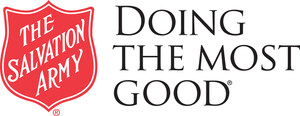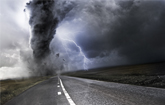Simulation-based exercises prepare disaster workers to effectively serve impacted communities
ALEXANDRIA, Va. , June 14, 2023 /PRNewswire/ -- As the 2023 Atlantic hurricane season gains momentum, The Salvation Army remains dedicated to assisting millions of survivors and first responders with critical services before, during, and after disaster events. To better serve the local communities most impacted by these events, The Salvation Army and the Southern Baptist Disaster Relief in Florida and Texas conducted comprehensive simulation-based training exercises to prepare disaster relief professionals and to enhance their knowledge and overall service capabilities. These simulations trained more than 40 disaster professionals to deploy bunkhouses, trailers, forts, and command posts that are crucial to ensure response and support efforts in times of need. As The Salvation Army encourages families to prepare for hurricane season, our professional teams are also preparing and ensuring we are ready to respond to any disaster.
The Threat on the Horizon
With the lingering impacts of the pandemic, inflation, and past disasters, many already vulnerable communities are facing a potential crisis if they find themselves the target of a natural disaster. The National Oceanic and Atmospheric Administration forecasts that the 2023 Atlantic hurricane season will witness the formation of 12-17 named storm systems. Furthermore, as reported by the National Interagency Fire Center, over 18,400 wildfires have already ravaged more than 518,500 acres throughout the United States in 2023 alone, with numerous additional incidents expected. According to the National Centers for Environmental Information, natural disasters cost the country $175.2 billion in damage in 2022 alone, with 14.5 million households at risk of major impacts this year.
Disaster Training Exercises
Recognizing the increasing importance of emergency response efforts after disasters strike, The Salvation Army and the Southern Baptist Disaster Relief of Texas and Florida conducted joint training exercises in Dallas, Texas, and Tampa, Florida, from June 12-14 to educate Salvation Army disaster professionals and on how to set up, maintain, and demobilize specialized equipment used to establish modular centers of operation during a disaster response. The events were also used to test Salvation Army equipment, ensuring it is ready for use at a moment's notice and for as long as it is needed.
During the exercises, disaster relief personnel were also trained on how to use the Starlink connectivity system to broadcast information and images from the ground after a disaster hits. The Salvation Army's EDS team is dedicated to continually improving its response and communication strategies during emergency situations and is leading relief groups in evolving the way information is disseminated during disasters.
"Simulation exercises play a vital role in our ability to be on the front lines with immediate response and recovery plans unique to affected communities," said Jeff Jellets, EDS director for The Salvation Army's Southern Territory. "These exercises allow us to fine-tune our response strategies, enhance coordination, and keep us updated on the latest techniques and technologies. Through comprehensive training, we are not only building the skills and knowledge of our personnel but also instilling the compassion and dedication that are at the core of The Salvation Army's mission."
Emergency Disaster Services
The Salvation Army's Emergency Disaster Services stands as one of the largest disaster relief organizations in the nation. Dedicated professionals and volunteers are at the forefront of meeting the physical, emotional, and spiritual needs of affected communities and can swiftly activate response efforts tailored to each unique situation. In 2022 alone, The Salvation Army aided nearly 600,000 individuals in the aftermath of over 4,300 hurricanes, wildfires, winter storms, heat waves, tornadoes, and other events. When disaster strikes, The Salvation Army collaborates with other aid organizations and federal, state, and local authorities to identify and mobilize resources through their national network of disaster professionals and service locations in all 50 states. Mobile response units provide essential services such as food, hydration, hygiene products, and emotional and spiritual care to both survivors and first responders.
"The Salvation Army remains steadfast in our commitment to serve local communities in every way we can," said Commissioner Kenneth G. Hodder, national commander of The Salvation Army. "We not only provide food, shelter, emotional and spiritual care, and rehabilitation programs to over 25 million people in America every year but are also often the first on the scene after a natural disaster. With a century-long history of responding to emergencies, we are committed to being at the forefront of providing relief in times of emergency and will continue to do so with unwavering dedication."
How You Can Help
The best way to support The Salvation Army's disaster preparation and response efforts is by making a financial contribution, which allows The Salvation Army to meet immediate and long-term needs. During emergency disasters, 100% of designated gifts are used to support specific relief efforts. Those who are able to donate can do so through a variety of convenient and safe methods:
- Visit SalvationArmyUSA.org.
- Call 1-800-SAL-ARMY.
- Make a contribution through Amazon Alexa by saying, "Alexa, make a donation to The Salvation Army."
- Or text "STORM" to 51555.
For more information about The Salvation Army's Emergency Disaster Services and how we serve in times of need, visit disaster.salvationarmyusa.org.
Media inquiries may be sent to: [email protected].
SOURCE The Salvation Army

WANT YOUR COMPANY'S NEWS FEATURED ON PRNEWSWIRE.COM?
Newsrooms &
Influencers
Digital Media
Outlets
Journalists
Opted In





Share this article